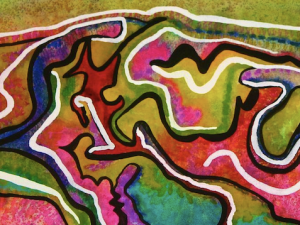
There is a big difference between response and reaction, and it is helpful to be clear about that distinction. I recommend intentionally carving out habits of responding rather than reacting, so that when push comes to shove, you’ll automatically make the right choice between the two.
Stephen Covey talks about that essential moment of choice between stimulus and response in his wonderful book Seven Habits of Highly Effective People. He urges that in pivotal moments, you take a second, and make a conscious choice. Doing so, it becomes obvious that reacting–either lashing out or feeling disempowered–is never the best choice.
Reaction is a mindless swing toward frustration, defense, or retaliation. Reacting is visceral, rigid, and enflamed, a thoughtless frame of mind. It reinforces whatever pain, fear, or powerlessness you were already feeling.
On the other hand, response is a more measured approach of acceptance, repair, release, courage, compassion, and generosity. Response is gentler to everyone, especially to yourself. It is thoughtful, diffusing, healing, and reconciling.
Obviously one feels very different than the other, but also, one has significantly more positive outward results than the other.
Examples of small things to practice not reacting to include, impatience with traffic or other drivers, inconsideration from friends or family members, not being invited when you think you should have, when you are not allowed to do what you want to do, when something you are working on doesn’t go well, when someone obstructs your progress or trips you up, when something is lost, when equipment breaks, when you are faced with injustice, prejudice, or lack of appreciation, when you are the brunt of someone’s antipathy. The list goes on endlessly, including more egregious things, but you get the idea. There are many opportunities to practice this skill.
I’ve been training myself over the years to respond instead of react. While I don’t yet have a perfect record, and there are still things that probably will push my buttons, experiencing the peace and magnanimity of taking the higher road has clearly become an overwhelming incentive. Reacting seems more glaringly distasteful to me the more I get used to the blessings and immediate freedom of consciously responding instead.
Often it is not so much the circumstances themselves, but what we make of them that harms us most. Marcus Aurelius wrote, “Consider how much more often you suffer from your anger and grief, than those very things for which you are angry and grieved.” Who wants to do that? I certainly don’t, and decided a long time ago to try not to do this to myself. Indeed, I have found it true that the way we take things determines what they will be to us or do to us.
The Buddha talks about two arrows. The first one is the initial event itself, which is some sort of painful experience. The second arrow is the one we shoot into ourselves by reacting. This arrow is unnecessary and totally optional. It only serves to amplify the initial pain. Contrariwise, if we can receive the first arrow with less identification and aversion, more as a strong peacemaker than a wounded defenseless victim, the pain dissipates.
Interestingly Mary Baker Eddy says almost exactly the same thing, “The mental arrow shot from another’s bow is practically harmless, unless our own thought barbs it.” She goes on to say, “It is our pride that makes another’s criticism rankle, our self-will that makes another’s deed offensive, our egotism that feels hurt by another’s self-assertion. Well may we feel wounded by our own faults; but we can hardly afford to be miserable for the faults of others.”
Whenever you are misunderstood or maligned, overlooked, injured or misused, I hope you find the courage not to buy into the situation. Instantly get some needed objectivity. Don’t retreat or cower, nor strike out in agitation or vexation. Look at it quickly from a higher perspective. Be part of the solution instead of getting yourself pulled into the problem. Choose to trust in good outcomes, instead of worrying. Don’t reinforce the pain of situations by downward spiraling into them. Rise above them instead.
Pain doesn’t cease by engaging with it. You have to look past pain to love to get it to go away. Likewise, hatred is never terminated by hatred, it takes love to vanquish it. Avoid reacting as much as possible, and teach yourself to instead routinely respond with love.
Start by being self aware. Monitor yourself and keep track of how you are doing. Make no excuses for your reacting; forgive yourself and consider how you could have handled it better. Pat yourself on the back every time you chose responding instead, even in all the little things. It will be so liberating, and feel so much better, you’ll want to do more of it!


4 Comments
-
Like these pictures, let my light be a beautiful reflection for the world.
-
Simplicity is the master of complexity.
-
Put so clearly, it all seems so simple!
I will endeavor to put into closer practice these
wise ideas. All the wisdom of God impells this desire, backing me up!Love your Reflection Photos, too. Thank you!
Pingbacks
-
[…] seemed honest and warranted; I certainly didn’t deserve another road block. But as I advised in my blog post of a couple months ago, I responded instead of […]






